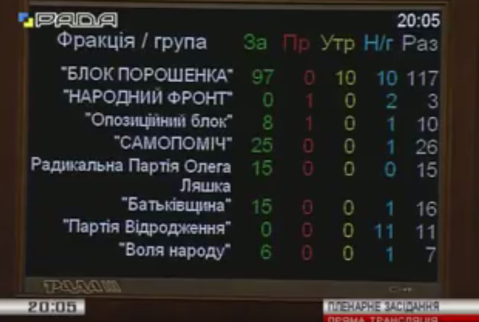During one of the Maidan rallies, now-Prime Minister Yatseniuk boasted his phony courage: “If [I have to take] a bullet in my forehead, then be it a bullet to my forehead”. That awkward phrase had become a political meme long before he was appointed a Prime Minister following the meltdown of Yanukovych’s regime at the end of February 2014. Yet it was during the parliament session on 16th February that his political demise seemed especially close, as the Verkhovna Rada finally heard a long-anticipated motion of no confidence to the government. Although many observers and even MPs appeared sure there would be enough votes to sack Yatseniuk, the prime minister survived the no-confidence vote easily. So what has gone wrong?
Arseniy Yatseniuk: Give me another five minutes, it might be my last speech.
Volodymyr Hroisman: Why are you being so pessimistic?
The 158 Spartans
10 a.m. She had let her hair down and bought new glasses to look beautiful on this warm February day. Yulia Tymoshenko had prepared to partake in a public flogging and eventually a dismissal of the man who she thinks had betrayed her. Rumor had it that the night before the Rada hearing her party was the first one ready to give Prime Minister Yatseniuk a boot the next day.
To put a no-confidence vote on the parliament’s agenda in Ukraine, you need to get signatures of 150 MPs, and the collection of MPs’ autographs started early in the morning. Boosted by curious cameramen’s attention and the growing list of signatures against Yatseniuk, Mrs. Tymoshenko had beamed with confidence. Little did she know that the tables would turn ten hours later.
As crowds of (to a great extent, paid) protestors grew outside the walls of the parliament, the 158 signatures were finally collected for putting the no-confidence on the Rada’s agenda in the afternoon. In this drama, the loaded gun has finally appeared on stage.
Shokin news
3 p.m. As the apprehension grew in Parliament, President Poroshenko’s Administration suddenly unveiled a headline-making statement. In his lengthy address, Poroshenko called on Prosecutor General Shokin to step down, as his Office has “failed to gain public trust” – quite an understatement for one of the most detested officials in the country.
The Ukrainian media – often quick to pick up an unconfirmed story – started publishing reports that Shokin had promptly resigned. Yet it is still unclear whether he did that or just resorted to the old bureaucrat tradition of taking a sick leave to avoid being dismissed.
In any case, Poroshenko’s announced his decision to publicly throw Shokin under the bus was supposed to achieve just one goal: make (almost) everyone believe that he also expects the same from Prime Minister Yatseniuk. Yatseniuk, however, showed up at the Rada to face the no-confidence vote.
Parliament’s impotence
6 p.m. The annual report that the government presented to the Rada was not an easy read. Scrap that: it was often painful, bulky and a waste of time. But the criticism levied against the Ministries by the heads of Rada committees was more ridiculous. For one, the head of the budget committee, Ms. Nina Yuzhanina of the Poroshenko Bloc (who had notoriously tried to undermine the budget process last year by introducing an alternative tax reform not compliant with the IMF requirements) had tried to chastise the Ministry of Finance for… not cooperating with her committee. The speeches of other parliamentary committee leaders betrayed their incompetence rather than the Cabinet’s shortcomings.
It was equally strange when it was faction leaders’ turn to air their grievances about the Cabinet. The whip of Poroshenko’s Bloc Yuriy Lutsenko delivered a passionate, emotional speech denouncing the government for not delivering on expected reform. The Interior Minister Avakov, who was sitting just meters away, tweeted that Lutsenko’s speech was “a talented and shameless demagoguery”. This comment minutes before the vote on no confidence shows how careless the minister closest to Yatseniuk really was about his coalition colleague, perhaps not something one would do if they thought their fate is hanging in the balance.
8 p.m. The Cabinet’s foes in the Rada smelled blood when the parliament managed to pass a declaratory, non-binding statement proclaiming the work of the government ‘unsatisfactory’. A solid majority of 240-something voted for it, despite Yatseniuk’s solemn pleas to “respect” the progress made by his team.
Some may have thought that the next step – the Cabinet’s dismissal – was a done deal. But when the speaker Volodymyr Hroisman put the motion for a vote several minutes later, the Rada screen showed that only 194 MPs had voted in favor. As many as 32 votes were lacking to bring the Cabinet down. Speaker Hroisman rushed to close the parliamentary hearing.
So who “saved” Yatseniuk? First of all, 20 MPs from Poroshenko’s Bloc did not vote for the dismissal, some of them personally close to the President himself (see the picture below). Secondly, two “oligarch-sponsored” groups abstained: Kolomoisky’s friends from the “Vidrodzhennya” group and Akhmetov’s people in the “Opposition Bloc” faction. This confluence of interests with oligarchs, sadly, remains a recurring theme in Ukrainian politics.
Power differentials
It is quite amusing to read some commentary on Twitter that the failed no-confidence vote will “worsen” relations between Yatseniuk and Poroshenko. This is quite wrong.
Let’s start with Poroshenko. With this elaborate show, the President has sent Yatseniuk just one message: “You would have been dismissed, if I had really wanted it. Behave”. Poroshenko knows all too well it would be a disaster to unilaterally assume the whole responsibility over Ukraine’s fragile economy: Yatseniuk has been useful as a scarecrow for the public opinion. What about Yatseniuk? He has accomplished two things: bought himself some precious time and held his faction together. Despite rumors of the disunity within the People’s Front (spread inter alia by Mustafa Nayyem from the presidential faction the day before), not a single MP voted against the government. This is the political capital that Poroshenko cannot (and will not) ignore.
The failed no-confidence vote will therefore change the political dynamics in Ukraine in a different way. First, Yatseniuk has become more dependent on the President’s goodwill, perhaps even too dependent to his liking. The smaller coalition members, who were effectively taught for the second time that their voices matter nothing when it comes to really serious business (first time was the budget), will formally or effectively leave the coalition. That said, Ukraine’s parliament is likely to keep working on the parliamentary majority based on the President’s and Prime Minister’s factions with situational support from smaller MP groups. Ironically, to pass laws in such a bind, the two badly need each other.
Yet Cabinet reshuffle is still possible
The cabinet changes will not be driven by the “toothless” parliament, but will emerge as a result of the Prime Minister accepting Poroshenko’s appointees. The failed no-confidence vote means that the parliament is not allowed to pass another vote of no confidence till September, when the next parliamentary session begins.
The good news is that the key pro-reform ministers – Jaresko, Pyvovarsky and Pavlenko – are going to keep their seats. Noteworthy, the amendments to the privatization procedure passed by the parliament were one of the key requirements of (now outgoing) Economy Minister Abromavicius and Finance Minister Jaresko, as it is supposed to launch a long-awaited privatization of state assets in the energy sector. The bad news is that the parliament will now be a lot harder to placate, when it comes to passing the government-initiated laws.
Hard landing for Tymoshenko
The biggest loser of the game (at least tactically) is Yulia Tymoshenko, whose rising popularity must have clouded her thinking. Unlike many of her less experienced colleagues in this Rada, Tymoshenko is no stranger to intrigue and cunning political schemes. (Just think of the 2009 plans to set up the “grand coalition” with Yanukovych back in the day, a Machiavellian design which would come to haunt her later).
But in the evening on February 16th Tymoshenko was furious: not only had her relished revenge against Yatseniuk failed, but her faction has been used as a cheap prop in the play. She quickly announced the withdrawal of the only minister from her faction in the cabinet (Minister of Youth and Sports, if you care) and announced that a “new coalition” would be created (a false, delusional premise, by any count).
Till recently, Tymoshenko was adamantly pursuing a pretty weird strategy: she formally remained in the coalition, but kept blasting the government’s policies in the most populist terms. She is now forced to move to the “open” opposition, but the real danger for her lies elsewhere. If her young MPs are as smart as they look, after yesterday’s story they had better start thinking if “Yulia’s instincts” are as well-honed as one assumes they are.








